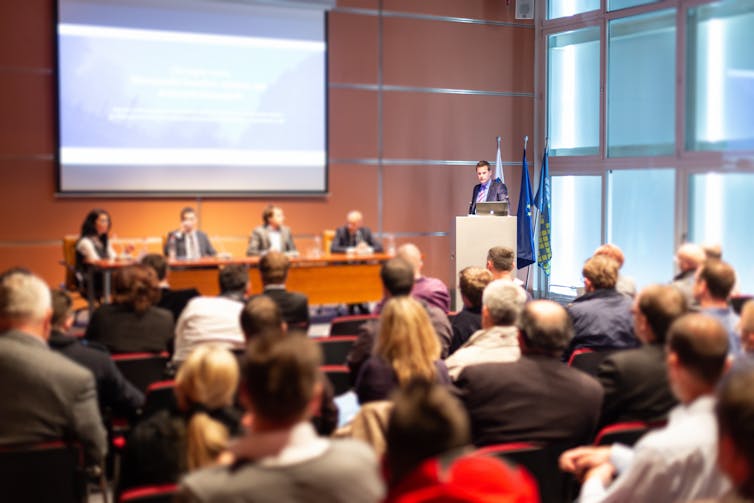What’s wrong with 'manels' and what can we do about them
- Written by Jenny K Rodriguez, Senior Lecturer in Employment Studies, University of Manchester
 Still a common sight at conferences.SeventyFour / Shutterstock
Still a common sight at conferences.SeventyFour / ShutterstockDespite making up half the world’s population, women’s voices continue to be underrepresented and excluded in public discussions, forums and panels. The frequency of these instances is so striking that it has its own term: “manel”.
The term refers to all-male panels and is used to highlight the exclusion of women as subject-matter experts. Manels are prevalent in social and work domains. From health economics, international relations, policy debates and public entertainment to myriad other public events, we see men given platforms despite the large number of women who are involved in these domains.
In this respect, manels perpetuate the underrepresentation and misrepresentation of women by completely ignoring them.
Why are they prevalent?
There are different reasons used to explain the absence of women in panels, such as there being more men than women in a field, or that women decline invitations more often than men. Underlying these reasons is the significant role of patriarchy in work and social life. Patriarchy translates into men holding power, influential roles, and control over knowledge and expertise.
We all have a tendency to prefer people we perceive to be similar to ourselves. Thus, men, who already hold positions of power, look for younger versions of themselves to mentor, connect with and to invite to participate in events and activities they organise. This can lead to all-male panels. Similarly, some research has shown that women are more likely to be invited as guest speakers when other women are organisers.
Manels are perpetuated by the lack of effort in doing the legwork to look at the world outside of familiar contacts, as well as lack of understanding of the importance of diversity for the quality of the conversation. Diversity broadens the number of perspectives brought into a discussion, creating spaces for engagement and innovation between different angles and viewpoints.
Even if manels are rarely the result of explicit sexism – the people who organise them do not set out to explicitly exclude women – it is important to question why they accept an all-male panel as an unavoidable outcome. More importantly, a manel reveals a lack of understanding of three basic points: manels are sexist, exclusive and not representative of the world we live in.
Why does this matter?
Aside from not being representative of the world we live in, manels have real-life consequences. When only men (and often men from a specific background) are presented as experts, the message to others is that one has to, for example, be a white man to be seen as a scientist, politician or pundit.
When only a specific group is repeatedly given the space to contribute to public discussion, it risks leaving other groups out – and without relatable role models. This further perpetuates stereotypes that can be internalised. Meanwhile, research shows that visible role models for underrepresented groups have positive effects on their life outcomes.
 Diversity must go beyond tokenism.Matej Kastelic / Shutterstock.com
Diversity must go beyond tokenism.Matej Kastelic / Shutterstock.comHomogeneity is also a problem because similar voices can result in silencing other expertise and alternative arguments. The ongoing COVID-19 pandemic exemplifies this. For example, there is the danger that too little attention is paid to gender aspects in medical trials, which could result in medications not working for women as well as men, or vice versa. At the same time, a more inclusive approach to discussing the current crisis is paramount to mitigate the risks for the most vulnerable. In the end it matters whose voices are amplified, if we want to find solutions which serve the whole of society.
What can we do?
There are many ways to avoid manels. Here are some useful steps for both panel organisers and attendees to follow:
1. Have a diverse organising committee
Organising groups should think about their own diversity. When more women, people of colour and people with different experiences come together to organise, their diversity can enrich what they produce collectively.
2. Avoid tokenism
It does not suffice to invite a woman because she is a woman. When someone is invited just because of their sex, their race, or any specific characteristic, they are seen as representative for all people associated with that characteristic. Look a bit harder for someone who is qualified – they are out there.
3. Check out these resources
The Conference Diversity Distribution Calculator can help to identify when a minority group is underrepresented. Groups such as the Brussels Binders (EU), the Women’s Room (UK), the Women Speaker Foundation (DE), Women Also Know Stuff (US) or Women for Media (AU) provide contact information for a wide variety of female experts.
4. For organisers
Follow the lead of institutions such as the US National Institutes of Health and the European Commission that have pledged to end manels. In terms of concrete actions, setting ground rules for the organisation, structure and running of panels is a useful practice.
5. For participants and audiences
Individuals can also take action by calling manels out and refusing to participate in them. More generally, acts of solidarity by men are essential in areas where they dominate the conversation. For example, they can suggest female colleagues and junior scholars to take their place. The audience can also take an active role prior or during an event to highlight that diverse voices are missing from the conversation. Hashtags such as #NoMoreManels or #GenderAvenger can be used to call panels to account and nudge changes.
In the end it is down to all of us to ensure that the plurality of expertise and insights gets heard.
The authors do not work for, consult, own shares in or receive funding from any company or organisation that would benefit from this article, and have disclosed no relevant affiliations beyond their academic appointment.
Authors: Jenny K Rodriguez, Senior Lecturer in Employment Studies, University of Manchester
Read more https://theconversation.com/whats-wrong-with-manels-and-what-can-we-do-about-them-148068
